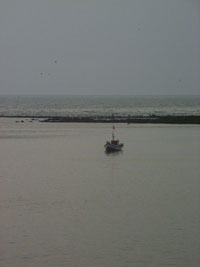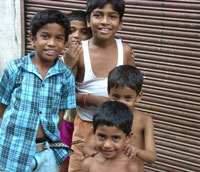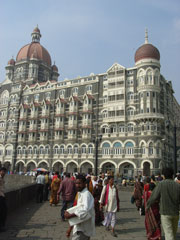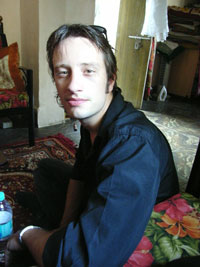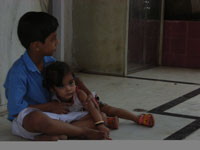Life and death in Mumbai
We're still in Bombay - as things are shaping up, we may be here for a bit longer, although everything is kinda up in the air at the moment. We've spent the last few days as spokes in the vast, swirling wheel of people that's formed around Shantaram writer Greg Roberts. He seems to have an unparallelled talent for accumulating people - people seek him out, and often stick around once they do. I suspect this is because his book has clearly touched many people on some fundamental level - people feel a real affinity for both book and writer - and in person he does the same thing.
This was demonstrated by a dinner we attended the other night at Salt Water Grill, one of Bombay's posher restaurants. The restaurant itself is a surreal enough experience - beach shack decor, tripped-out techno and gourmet food, a haven for the city's up-and-coming bright young things that's a world away for the relentless sea of people and poverty outisde. Anyway, Greg invited us for dinner - his agent was going back to New York, and they were having dinner to celebrate his last night in town.
We'd envisaged it as being a quiet affair, but as it turned out, more and more people kept arriving over the course of the night. In the end, about 30-40 people turned up - mostly an assortment of bon vivants from the Bombay entertainment scene, a mix of Bollywood starlets, writers, producers, publishers, models, DJs, VJs... and us. It was all quite overwhelming at first, and we didn't get the chance to speak to Greg himself much, but we did meet a heap of other people, most of whom were faultlessly friendly and outgoing. We left having made a whole bunch of new friends, so all in all, it was a very pleasant and productive evening.
Over the last couple of days, we've also made the acquaintance of a fascinating lady called Dolly Thakore, renaissance woman par excellence - she's been in the Bombay entertainment industry for nigh on 40 years, and seems to do anything and everything (her website describes her modestly as a "communications consultant, media relations manager, publisher, TV and radio commentator and interviewer, presenter, casting director, columnist, film and theatre reviewer, compere, auctioneer, stage actress, and social worker" - phew!)
As you'd expect, she has seemingly boundless energy - I'd be happy to be able to do any one of those things, let alone all of them - and fingers in just about every pie in the city. She was also very good company - generous enough to entertain us at her house, even though she didn't know us from the proverbial bar of soap, and full of anecdotes about her life, the people she's met, and the host of things she's done over the years. Her website (at www.dollythakore.com) makes for some interesting reading.
All this, then, has been the upside of our experience. It's been quite a strange contrast - living the high life, then trundling home to our little budget hotel, traipsing up four flights of stairs and opening all the windows and turning on the fan to try to cool the place down. In any case, it's all been put into perspective by yesterday morning's events, when a British tourist died in the room down the corridor.
I debated whether it was appropriate to write about this here, and in the end I decided to - after all, it did happen, no-one he knew will read this, and it's something we saw that may perhaps have resonance for others. So, this is what went on: apparently the guy been out the night before, and when the morning came his friends tried to wake him up and found that he wasn't breathing. The first we heard of it was when his distraught travelling companion came running down the corridor shouting for an ambulance. It's strange - it takes a while for the gravity of a situation to kick in, because at first everyone just sort of stood about, then someone called an ambulance, and we went in to his room to try to help.
It was much too late, though - one look at the poor bugger and you could see that he was already dead: he was cold, and stiff, and a horrible colour. Still, we tried CPR as best we could - not very well, it must be said, and the whole experience has certainly convinced me that first aid training is a must for everyone, because of all the people in the hotel, no-one knew how to do it properly, and you do hear of these miracle stories where people get revived after being clinically dead.
In this case, though, it wouldn't have made any difference. Eventually, the ambulance arrived, and the ambulance guys refused to take him, saying that they couldn't do anything without a doctor's verdict - at first, it appeared to be heartless stickling for bureaucracy, but in retrospect, I guess they knew that he was dead, and that they couldn't take a dead body to hospital. Anyway, I dashed off to Nasir's place to fetch a doctor (there's an Australian doctor who lives across the road), who came and eventually confirmed what I think everyone already knew but didn't want to admit to his friends. Apparently he'd died in the night - the doctor thought that he might have overdosed on something, although I guess we'll never really know.
The rest of the morning was spent with the police, the ambulance, the hotel owner, etc. The worst part of it all was seeing his friends so distraught, and thinking of his parents etc - after all, he was only 28, and was apparently on the trip of a lifetime, a motorcycle journey from Britain down to India. The rest of the day passed in a bit of a daze - you always wonder quite how you'd react in such a situation, but you never really know until it happens. It's not an experience I'd care to repeat in a hurry.
Without meaning to get too "smell the flowers" about it, it does focus your mind on living your life, as one morning you might just not wake up. A sobering conclusion to a good week.
